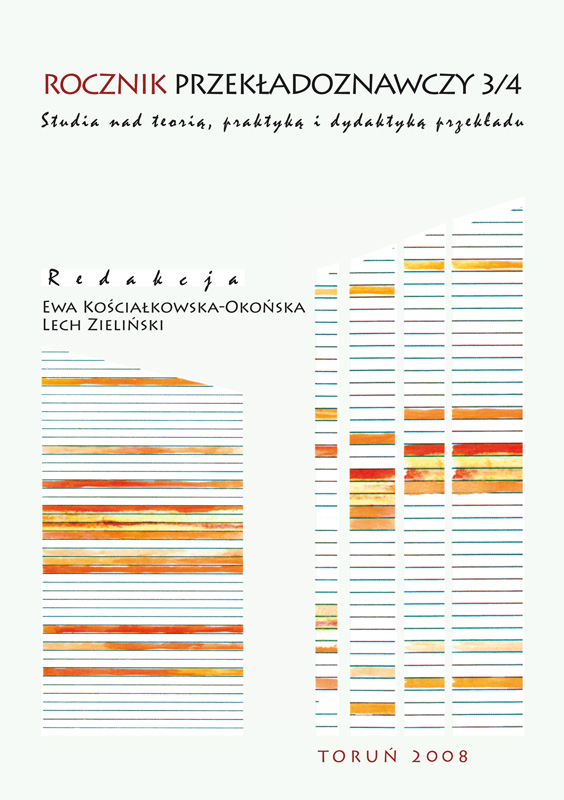„Prawdziwi przyjaciele tłumacza” a dydaktyka i praktyka przekładu
DOI:
https://doi.org/10.12775/RP.2008.020Słowa kluczowe
ekwiwalencja całkowita, fałszywi przyjaciele, prawdziwi przyjaciele, dydaktyka przekładuAbstrakt
Artykuł jest próbą wypełnienia luki w badaniach dotyczących tzw. prawdziwych przyjaciół tłumacza, czyli par wyrazowych w dwóch językach, identycznych lub podobnych na tyle, że możliwe jest tworzenie ich na zasadzie analogii jednego języka do drugiego. Autorka analizuje występowanie takich par na przykładzie tłumaczeń tekstów popularnych i specjalistycznych (polskich i niemieckich) oraz kryteria rozróżnienia „prawdziwych” i „fałszywych przyjaciół”. Dyskutowane są także możliwości lematyzacji i opisu leksykografi cznego w dwujęzycznym słowniku „prawdziwych przyjaciół”, jak również implikacje dla dydaktyki i praktyki przekładu.
Bibliografia
Bolinger, D. L. „1464 Identical Cognates in English and Spanish”, [w:] Hispania 31 (1948), s. 271–279.
Braun, P., Schaeder, B., Volmert, J. (red.), 1990, Internationalismen. Studien zur interlingualen Lexikologie und Lexikographie, Tubingen.
Chodacka, M., Schoff el, H. J., 2000, „Es gibt auch ≫Echte Freunde≪ in der Fremdsprache”, [w:] Studia Germanica Posnaniensia XXVI, s. 169–182.
Hengst, K., 1977, „Lehnwort – Internationalismus – Analogonym: Zur Semantik fachsprachlicher interlingualer Analogonyme im Russischen und Deutschen: H. H. Bielfeldt zum 70. Geburtstag”, [w:] Zeitschrift fur Slawistik 22, s. 250–259.
Jabłoński, M., 1990, Regularitat und Variabilitat in der Rezeption englischer Internationalismen im modernen Deutsch, Franzosisch und Polnisch: aufgezeigt in den Bereichen Sport, Musik und Mode, Tubingen.
Koessler, M., Derocquigny, J., 1928, Les faux amis ou Les trahisons du vocabulaire anglais: Conseils aux traducteurs, Paris.
Lipczuk, R., 1992, „Internacjonalizmy a ≫fałszywi przyjaciele tłumacza≪, http:// www.lingwistyka.uni.wroc.pl/jk/JK-07/JK07-lipczuk.pdf.
Lipczuk, R., 1991, „≫Falsche Freunde des Ubersetzers≪ als Gegenstand der linguistischen Forschung und der lexikographischen Praxis”, [w:] Acta Universitatis Nicolai Copernici. Filologia germańska 14, s. 95–102.
Lipczuk, R., 1993, „Faux Amis. Tautonyme. Internationalismen”, [w:] Studia i materiały. Germanistyka 10, s. 29–38.
Lipczuk, R., 2000, „‘Fałszywi przyjaciele tłumacza’ w słownikach niemiecko-polskich”, [w:] Problemy frazeologii i leksykografii, Kątny, A., Hejwowski, K. (red.), Olecko, s. 13–21.
Lipczuk, R., Bilut-Homplewicz, Z., Kątny, A., Schatte, Ch., 1995, Niemiecko-polski słownik tautonimów, Warszawa.
Lipczuk, R., Buncič, D., An online hypertext bibliography on false friends, www.lipczuk.buncic.de.
Lipczuk, R., Potschke, H., 1992, „Internationalismen im deutschen und polnischen Sportwortschatz”, [w:] Deutsch als Fremdsprache 2/1992, s. 104–108.
Słownik języka polskiego PWN, 1995, Szymczak, M. (red.), Warszawa.
Szulc, A., 1984, Podręczny słownik językoznawstwa stosowanego, Warszawa.
Szulc, A., 1997, Słownik dydaktyki języków obcych, Warszawa.
Wilczyńska, W., 1992, „≫Faux amis≪ czy ≫amis infi deles≪ – definicja a praktyka”, http://www.lingwistyka.uni.wroc.pl/jk/JK-07/JK07-wilczynska.pdf.
Pobrania
Opublikowane
Numer
Dział
Statystyki
Liczba wyświetleń i pobrań: 1371
Liczba cytowań: 0



